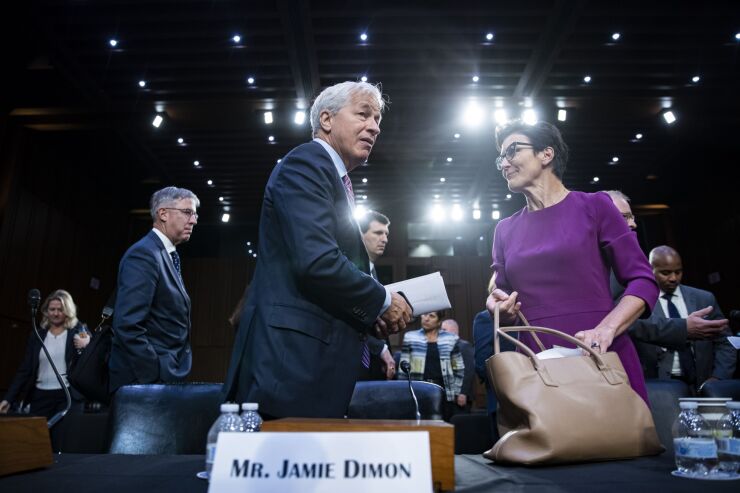WASHINGTON — The currents of culture war hung heavily over a second day of large-bank CEO hearings on Capitol Hill on Thursday, as Senate Republicans threatened consequences for financial institutions that prove too deferential to progressive causes.
Speaking before the Senate Banking Committee, CEOs representing seven large banks — JPMorgan Chase, Citigroup, Bank of America, Wells Fargo, U.S. Bancorp, Truist Financial and PNC Financial — faced a smaller crowd of lawmakers than
Senate Banking Committee Chair Sherrod Brown, D-Ohio, had harsh words for the CEOs in his opening remarks, suggesting their banks had more work to do to rebuild customer trust. They identified consolidation among regional banks as a concern.

"Trust goes both ways. And with crisis after crisis, and scandal after scandal, the biggest Wall Street banks have lost the trust of the American people," Brown said. "And as super-regional banks get bigger and more complex, they're starting to look more and more like Wall Street."
The committee's top Republican, Sen. Pat Toomey of Pennsylvania, also had a dire warning for the CEOs gathered Thursday, saying that a GOP majority on Capitol Hill might attempt to limit the ability of banks to support progressive causes.
"Some of my colleagues are pressuring banks to use both their balance sheets and their influence to address issues wholly unrelated to banking, such as global warming, gun control, voter rights and abortion," Toomey said in his opening remarks. "Several large banks have been far too willing to acquiesce to these demands by embracing a liberal ESG agenda that harms America."
"If banks don't cease and desist from weighing in on social and cultural issues, don't be shocked if Republicans, once back in power nationally, seek to pressure banks to advance their goals," Toomey said, with the caveat that he would oppose such a push if it came to pass. (Toomey will exit office after the current session of Congress.)
Several of Toomey's Republican colleagues echoed similar sentiments throughout Thursday's hearing. Sen. John Kennedy, R-La., told the CEOs that "you will never win — never — the über-woke sweepstakes."
Brown, speaking to reporters after the hearing, dismissed the GOP concerns. "They always look for demagoguery — the political benefits brought to you by demagoguery," Brown told reporters during the scrum, which was broadcast by CSPAN. "They're really good at that. It's fairly meaningless, but it's what they're good at."
Later, Toomey enlisted Jamie Dimon, chairman and CEO of JPMorgan, to discuss the risks of overreach by the federal bank regulators in climate risk management, specifically at the Federal Reserve. Michael Barr, who was sworn in as the Fed's vice chair for supervision in July, has said he intends to

"I'm not accusing anybody at the Fed of anything," Toomey said, "but do they, as a practical matter, have the power … [to] effectively pressure financial institutions into directing capital where they want?"
Dimon replied: "Speaking for myself, they are my judge, my jury and my hangman. They can do whatever they want unless constrained by you."
Several Democratic senators continued to hammer the CEOs on the risks of fraud on the bank-owned peer-to-peer payments platform Zelle, including Sens. Brown and Elizabeth Warren of Massachusetts. Warren dedicated the entirety of her question time to Zelle-related issues, criticizing all the CEOs — except Truist's William H. Rogers Jr. — for not providing her office the number of fraud claims made by their customers using Zelle, a request she made in July.
"You profit from every transaction on the system, and you tell people that it is safe," Warren said. "But when someone is defrauded, you claim that's the customer's problem."
The CEOs repeated the defenses they made in the House on Wednesday, arguing that Zelle saw lower rates of fraud than other P2P payment platforms and that all unauthorized Zelle transactions were refunded to victims of fraud, which is required by federal regulation.
Progressive policymakers have pushed for the banks behind Zelle to do more to make customers whole when they're scammed into approving transactions that are ultimately fraudulent.
Several of the CEOs said they were committed to coordinating with their fellow co-owners of Zelle to make it harder for scams to occur.
"We reimburse according to" Regulation E, Rogers said. "We reimburse way beyond that, focusing on our clients, and try to take care of the challenges they're facing. But as I said in my testimony, we also need to focus on working together, in partnership with law enforcement, regulatory agencies, to actually catch the criminals who are perpetuating their fraud against our consumers."





